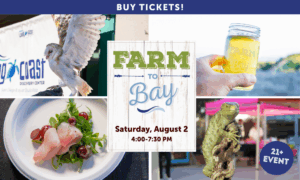Educational Programs for All
Since opening in 1987, the Living Coast Discovery Center has offered various educational programs right here on the San Diego Bay National Wildlife Refuge, Sweetwater Marsh.
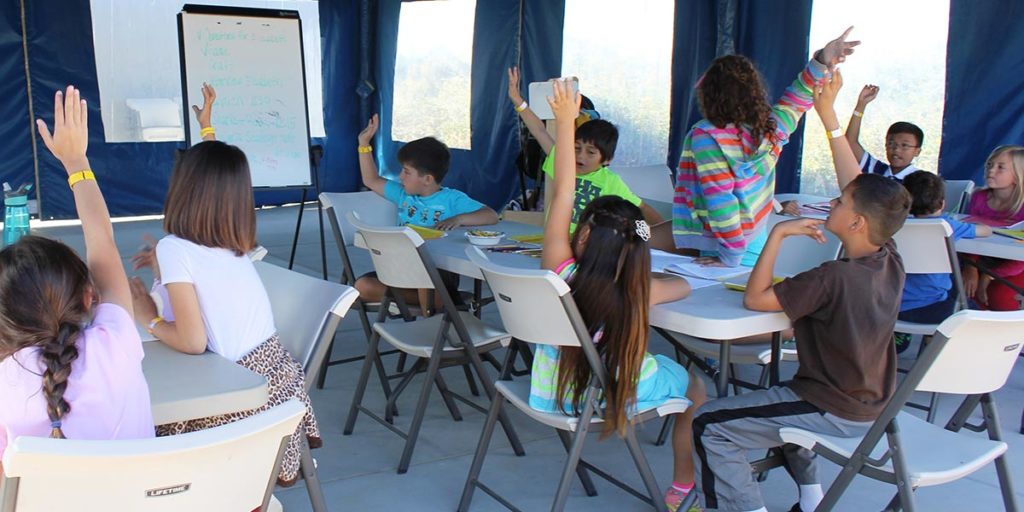
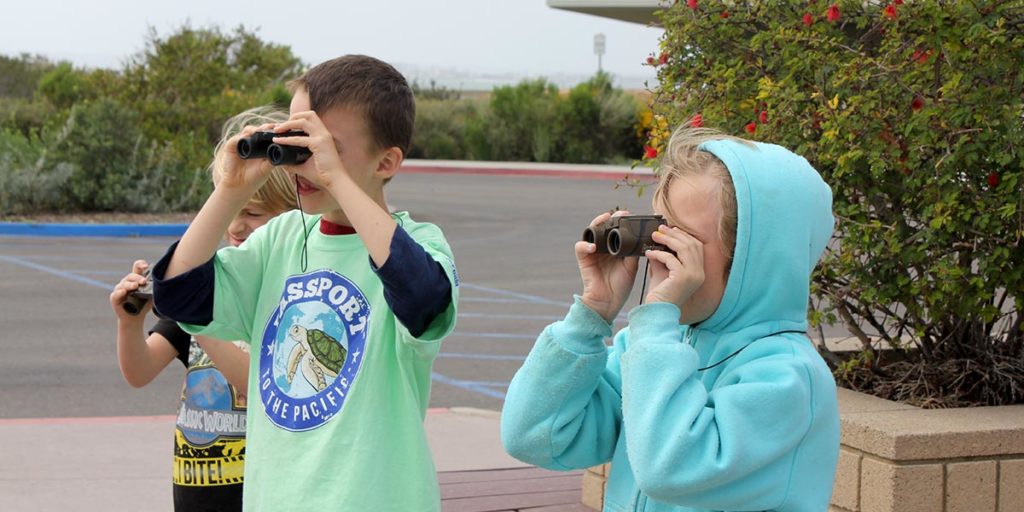
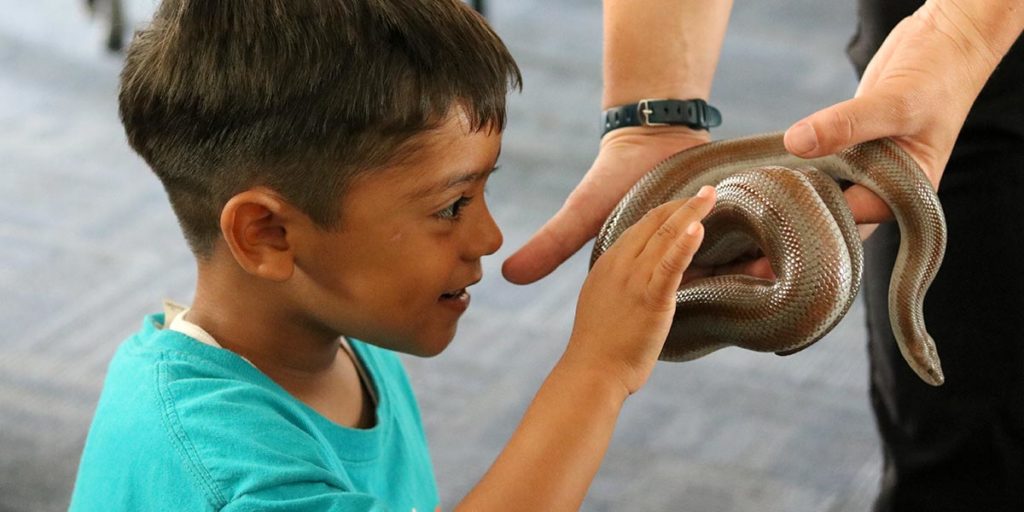
Field Trips
(Outreaches can be booked below)
Begin exploring the natural world! We have numerous educational classes designed to be fun, engaging, and age-appropriate. Preschool programs include an hour-long lesson and craft facilitated by a Living Coast Education Instructor. K-12 Programs are station-based, with some stations led by Living Coast staff members and docents.
Classroom teachers and/or chaperones must lead stations using provided resources if docents are unavailable. The exact program schedule and stations vary by group size and program type. Field trip programming takes approximately 4 hours. Please be prepared for programs to occur outside, rain or shine.
Program Fees
- $350 / class (includes 32 students & 3 adults)
- $11 / extra adults (Max of 5 per class; staff or parent, no siblings)
- $50 / shuttle (for groups requiring Living Coast staff to pick up from parking lot)
Program Times
Our Living Lab field trips have two schedule options:
- 9:30 AM – 1:30 PM
- 10:00 AM – 2:00 PM
Included with Fees
- Program by trained staff
- Scavenger hunts for exploring aquarium
- Trail backpacks with teacher-led activities
- Exploration of exhibits, including turtles, sharks, and eagles
- Provided lunch space with storage
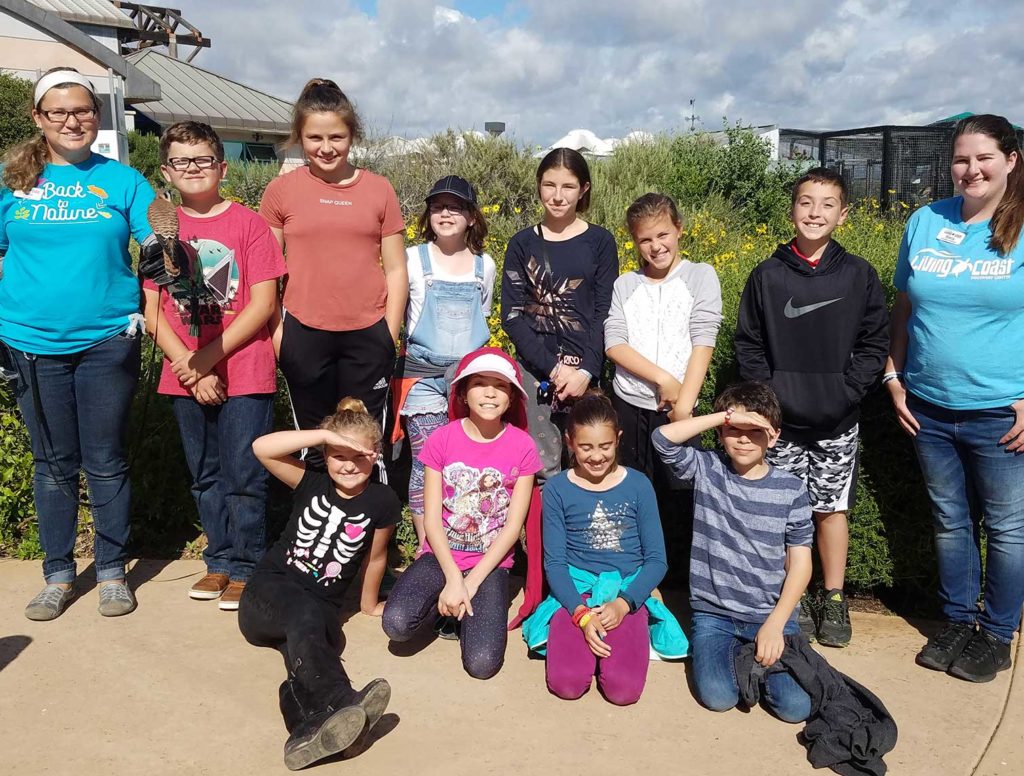
Choose your program!
TK-Grade 2
Hooterific (Grade TK)
Hooterific (Grade TK)
Learn about the unique adaptations an owl has to help it survive. Students will learn about the beak, feathers, and wings as they dress up a classmate. And your class is sure to have a hooterific time meeting one of our owl ambassadors through this program!
BOOK NOW: Field Trip | Outreach
Move It! (Grade TK)
Move It! (Grade TK)
Animals slither, swim, jump, and fly in very interesting ways. Students will learn about local animals that call San Diego home. Through fun dance moves and up-close animal encounters, children will walk away knowing how to crawl like a tortoise and slither like a snake.
BOOK NOW: Field Trip | Outreach
Totally Tidepools (Grade TK)
Totally Tidepools (Grade TK)
Students will learn about tide pools as a habitat and the animals that live there. Through up-close animal encounters, they will learn about their adaptations and how they can survive life on the rocks.
BOOK NOW: Field Trip | Outreach
Crawling Crabs (Grade K)
Crawling Crabs (Grade K)
Come crawl into the world of crabs and other crustacean relatives. Learn about adaptations with fun hands-on exploration. Students will enjoy touching and observing crustacean molts and live crabs.
Stations: Crab Encounter, Just Passing Through, Read-a-loud
BOOK NOW: Field Trip | Outreach
Slithering Snakes (Grade K)
Slithering Snakes (Grade K)
Slither yourself into the world of reptiles. Learn, through hands-on exploration, the adaptations that make snakes a successful predator. Students will get to have an up-close encounter with a snake.
Stations: Read-a-loud, Snake Encounter, Eating & Molting
BOOK NOW: Field Trip | Outreach
Arthropods All-Around (Grade 1)
Arthropods All-Around (Grade 1)
Arthropods are all around, just waiting to be observed by bug-eyed scientists. With microscopes and magnifying glasses, the small world of arthropods will come alive.
Stations: Insects vs Arachnids, Molting & Crustaceans, Magiscopes & Kaleidoscopes, Bug Hunt
BOOK NOW: Field Trip | Outreach
Beaks and Feet (Grade 1)
Beaks and Feet (Grade 1)
Come soar into the world of birds and find out what structures they have to help them survive. Students will get to experiment with “beaks” and learn to use binoculars.
Stations: Beak Experiment, Just Passing Through, Bird Watching, Foot Quest
BOOK NOW: Field Trip | Outreach
Budding Botanist (Grade 1)
Budding Botanist (Grade 1)
Dig into the world of plant adaptations. An engaging lab, where students will get to practice their observation skills and study the leaves of real native plants found right here on the marsh!
Stations: Plant Characteristics Hike, Water Conservation Adaptations, Magiscope Plant Drawing, Leaf Rubbing
BOOK NOW: Field Trip | Outreach
Footprints on the Marsh (Grade 2)
Footprints on the Marsh (Grade 2)
Tread lightly – our impact can be bigger than we think. Students will get to observe with binoculars native birds and their local habitat. Students will record and tally different species for comparison.
Stations: Just Passing Through, Habitats & Adaptations, Bird Watching, Nature Journaling
BOOK NOW: Field Trip | Outreach
Perfect Pollinators (Grade 2)
Perfect Pollinators (Grade 2)
What could be more perfect than learning about pollinators in a living garden? They’ll get hands-on with pollination and discover its importance to native species. Through fun, interactive role-play, the students will get hands-on with the entire pollination sequence!
Stations: Pollination Pantomime, Seed Dispersal, Bug Hunt, Nature Journaling
BOOK NOW: Field Trip | Outreach
Grades 3-5
Crustacean Lab (Grade 3)
Crustacean Lab (Grade 3)
Ever wonder what it means to be a crab? Get up close with crabs, lobsters, and other crustaceans as you explore the world of arthropods. From exoskeletons to real live animal encounters, students will learn what it means to be a marine invertebrate. Your students will be excited about their crabbing adventures and all that they learned in the crustacean lab.
Stations: Crustacean Comparison, Crabbing, Biofacts & Adaptations, Nature Journaling
BOOK NOW: Field Trip | Outreach
Shark's Tale (Grade 3)
Shark’s Tale (Grade 3)
Students will become shark experts on local species and may even get to meet a shark up close! This interactive lab teaches students about the many adaptations these top predators have to survive.
Stations: Shark Ethogram, Eat Experiment, Biofacts & Adaptations, Move Experiment
BOOK NOW: Field Trip
Food Chain Hunt (Grades 3 - 5)
Food Chain Hunt (Grades 3 – 5)
Kick-start your ecology knowledge with a fun exploration of the Sweetwater Marsh Refuge. What better way to study ecology than to become an ecologist yourself? Students will study important aspects of ecology, such as adaptations, predator-prey relations, and the recycling of organic matter. Then, students will apply their new knowledge by looking for evidence of different animal species while hiking the trails around the refuge.
Stations: Food Chain – Upland, Habitat Restoration, Food Chain – Wetland, Bird Watching
BOOK NOW: Field Trip
Something's Fishy (Grade 3 - 5)
Something’s Fishy (Grade 3 – 5)
Get your hands all scaly and slimy with this dissection. Students will learn about the ins and outs of a fish and how their internal anatomy is really not that different than ours! Through this fun, interactive dissection, students explore the internal and external parts that help a fish survive in a marine environment.
Stations: Dissection Lab, Outdoor Exhibit Exploration
BOOK NOW: Field Trip | Outreach
Something's Squidy (Grades 3 - 8)
Something’s Squidy (Grades 3 – 8)
Students will learn about the internal and external parts that help a squid survive, and focus on how they exchange energy and matter with their environment.
Stations: Dissection Lab, Outdoor Exhibit Exploration
BOOK NOW: Field Trip | Outreach
Grades 6-8
Eat, Not Eaten (Grades 6 - 8)
Eat, Not Eaten (Grades 6 – 8)
This program is a perfect introduction to everything ecology. Come be challenged by the delicate balance of an ecological food web that must overcome disasters, natural and man-made alike.
Stations: Food Chains & Webs, Natural Disasters & Impacts, Bird Watching, Habitat Restoration
BOOK NOW: Field Trip | Outreach
Fish'N'Me Dissection (Grades 6 - 8)
Fish’N’Me Dissection (Grades 6 – 8)
Through a fishy and fun dissection, students will compare what parts of a fish are similar or different to humans. Fish provide an excellent model for scientific exploration and comparison of vascular systems.
Stations: Dissection Lab, Outdoor Exhibit Exploration
BOOK NOW: Field Trip | Outreach
Watershed Chemistry (Grades 6 - 8)
Watershed Chemistry (Grades 6 – 8)
Students will visit a local wetland to sample current conditions. Learn the importance of variables such as salinity, pH, turbidity, and oxygen when it comes to monitoring the health of an ecosystem!
Stations: Watershed Model, Plankton Lab, Nature Journaling, Watershed Chemistry
BOOK NOW: Field Trip
Grades 9-12
AWE Chemistry! (Grades 9 - 12)
AWE Chemistry! (Grades 9 – 12)
Join us at the bay for an engaging lesson about Advanced Watershed Ecosystems Chemistry. Students will visit our local wetland to sample current conditions. Learn the importance of variables such as salinity, pH, turbidity, and oxygen in monitoring ecosystem health!
Stations: AWE Chemistry, Habitat Restoration, Plankton Lab, Nature Journaling
BOOK NOW: Field Trip
Jr. Ichthyologist (Grades 9 - 12)
Jr. Ichthyologist (Grades 9 – 12)
Students will dissect fish to learn about their anatomy and physiology. As ichthyologists, they will study how environmental factors affect the health of fish, the importance of protecting ecosystems, causes of population die-offs, and why science is essential to understanding the role that humans play in their environment.
Stations: Dissection Lab, Outdoor Exhibit Exploration
BOOK NOW: Field Trip | Outreach
Where's My Shell? (Grades 9 - 12)
Where’s My Shell? (Grades 9 – 12)
Mollusks have been classified as soft bodied animals with shells. But some modern mollusks have evolved, missing their shell! Through this program, students will dissect squid and explore the evolution of this shell-less mollusk. Students will look for patterns in how organisms are classified, and compare-contrast squids to other living mollusks.
Stations: Dissection Lab, Outdoor Exhibit Exploration
BOOK NOW: Field Trip | Outreach
Title 1 School Financial Aid
Through the generous support of local organizations and foundations, financial support is available for Title 1 schools.
2024-2025 Important Dates
School Registration Opens: August 5
Last Day to Apply for Title 1 Aid: March 15, 2025 (limited sponsorships available; apply early)
Education Department Contact Info
education@thelivingcoast.org | (619) 409-5908
Thank you to Cox Charities for their support of Living Labs Field Trips.

